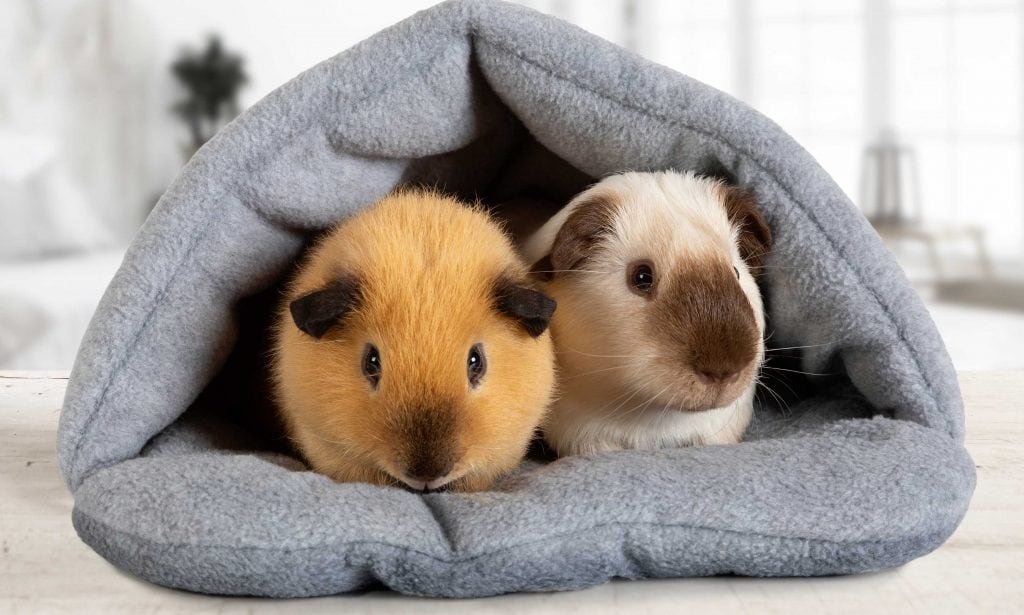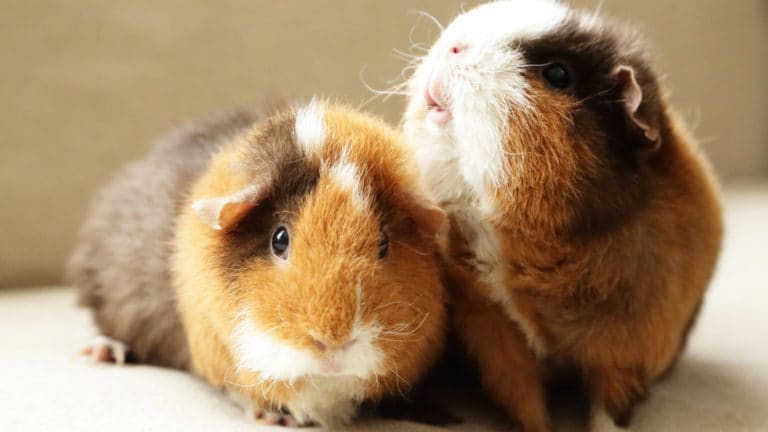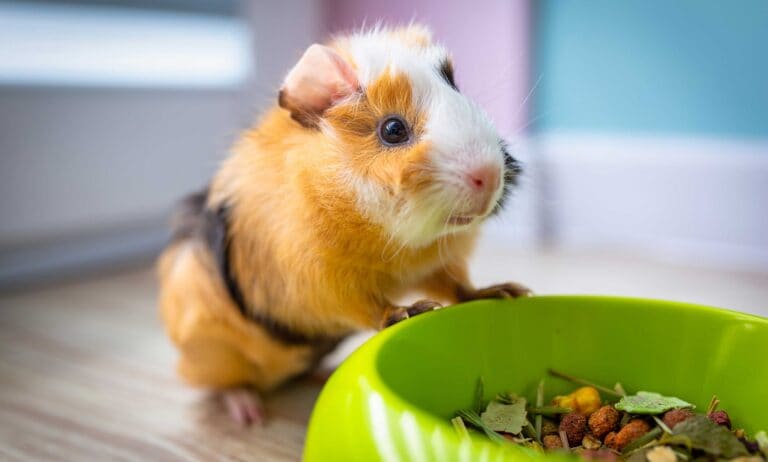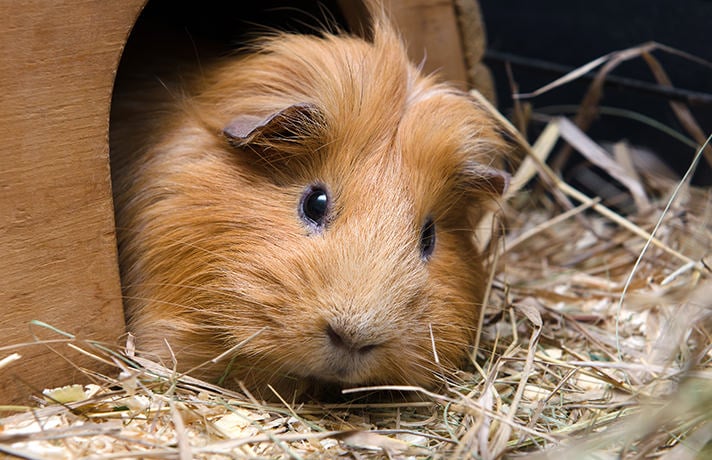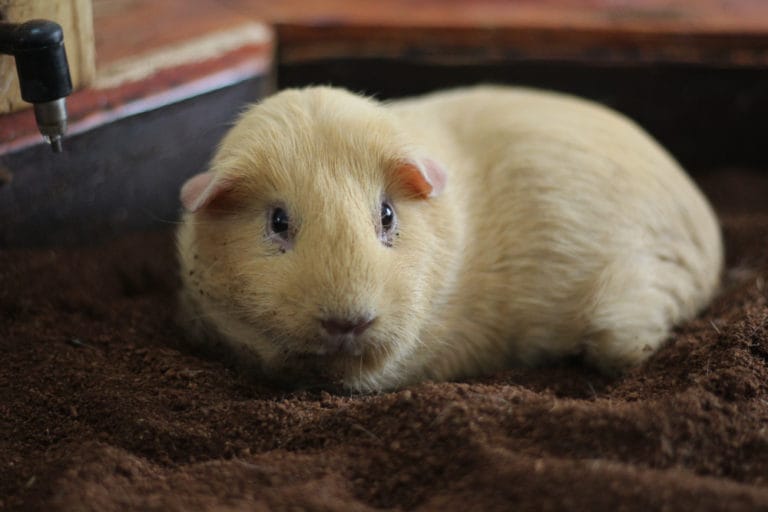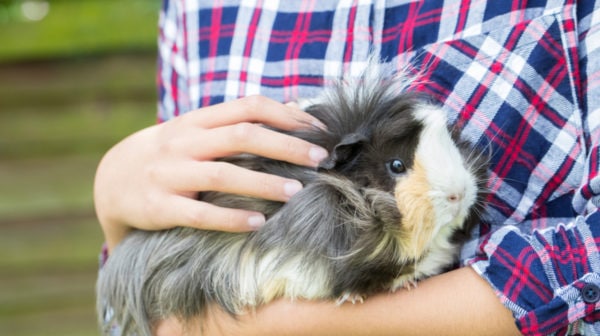Guinea pigs—those adorable small animals with large heads, perpetual looks of surprise and gleeful squeals—are definitely a pet to be seen and heard. But why do they do the things they do?
As a guinea pig parent, you want to get to know your pet and form a solid bond. And one great way to do that is by understanding common guinea pig behaviors—so you know what you’re likely to come across when sharing your home with these cute little piggies.
We spoke with a guinea pig expert to round up 10 common guinea pig behaviors and explain what they mean.
1Catch Me If You Can
@theguineapigfacts Why guinea pigs are running away? #guineapiglove #guineapigfacts #guineapigcare #guineapigs ♬ original sound - Guinea Pig Facts
Don’t take it personally if your guinea pig runs away from you when you attempt to pick them up. Fleeing is hard-wired into the guinea pig’s psyche. Give your guinea pig time to get to know you, which may or may not curb their fleeing instincts when someone enters their space.
Never chase your guinea pig, as this can cause stress. You can get your little buddy used to you by placing your hand in their cage. After they’ve become comfortable with that, you can offer pets. And after that’s gone well, you can pick them up.
A guinea pig house, like the Oxbow Timothy Club Tunnel Small Animal Hideout, gives your piggy a chance to discover things that could be potentially scary from the comfort and security of their own safe space.
2Do the Popcorn
@theguineapigfacts Why guinea pigs are popcorning? #guineapigfacts #guineapiglove #guineapigcare #guineapigs #popcorning ♬ original sound - Guinea Pig Facts
Yes, guinea pigs (also called cavies) have their own signature dance move, and it’s called “popcorning.” The move goes a little like this: run, jump in the air, land on all fours, bounce up in the air again and turn the other way. Now imagine these moves set to the sound of popcorn popping and you will understand why it’s referred to as “popcorning.”
A popcorning guinea pig is a happy piggy, and young guinea pigs tend to bust out the move quite frequently.
3Freeze!
@gphoneydaisy What does mu Guinea Pig seem frozen for extended periods of time?? #DanceWithTurboTax #guineapigs #guineapigsoftiktok #honeyanddaisy #guineapiglove #fyp #fypシ #fypage #guineapigtok #guineapigfun #guineapigowner #guineapigforlife #animalslover #babyguineapig #guineapigmom #guineapigs4life #guineapigsofthetok #cuteguineapig #guineapigfunny #sleepingguineapig #guineapigsleeping #guineapigsleepingpositions #cavie ♬ Spongebob Theme - Unay
Guinea pigs freeze when they feel threatened, either by noise, sudden movement or by something unfamiliar in their environment. Their goal is to be as invisible as possible.
This behavior also lets fellow guinea pigs know something might be up. Imagine Jill guinea pig socializing with Joe guinea pig, when Joe suddenly goes all statue-like on her—“Joe? Joe?” Jill will soon follow suit. As a prey animal, no guinea pig wants to bring attention to themselves when a predator might be near.
4Eyes Wide Open
@guineapigdoodles They seriously scare the heck out of me every time when I see them in a deep sleep with their eyes wide open🤦🏻♀️ #guineapigs #cavylove #smallpets #guineapigsleeping #sleepingpets #passedout #zonedout ♬ Creepy and simple horror background music(1070744) - howlingindicator
It is likely you will never see your guinea pig’s eyelids because guinea pigs rarely close their eyes—even while sleeping! All those times you thought your guinea pig was in deep thought or mesmerized by the new light fixture overhead, they might very well have been taking a quick catnap.
A super-duper relaxed guinea pig might close their eyes for some sleep. If this happens, take it as a compliment—your pet feels safe and secure in their guinea pig cage.
5No, He’s Not Scratching an Itch—He’s Marking
@guineapigjungle WHY DO GUINEA PIGS SCENT MARK?? #guineapigs ♬ original sound - guineapigjungle
If you spy your guinea pig dragging their tush along the ground of their home environment—or any area they have frequent access to—they don’t have an itch to scratch; they are laying down their territorial claim. This is often done in new environments and in mating situations.
Essentially they’re saying to other guinea pigs, “This belongs to this little piggy!”
6Guinea Pig Sounds Mean Something
For being a prey animal, guinea pigs sure do make a lot of noise.
Want to decipher what your guinea pig is trying to tell you? Use these guidelines.
- When they’re excited, you may hear a high-pitched squeal. One way to get a guinea pig to squeal is to hold up a favorite food for them to sniff out. They will be saying, “Dibs!” with some very audible squeals.
- When they’re relaxed, content, and feel safe, such as when you’re holding them or petting them, a guinea pig might let out a low-pitched purr that sounds like they’re “bubbling.”
- When they’re in pain, they may let out high-pitched, short squeaks or even a scream.
- When they’re annoyed, a guinea pig may make a high-pitched, short and stiff purring
- When they’re scared, guinea pigs will sometimes scream.
- When they’re hungry, they’ll making a “wheeking” sound.
7Standing Up
@gpigsr_c Guinea pigs standing on hind legs #guineapigbehavior #healthforcavys #cavys #smallpotato #loveguineapigs #guineapig ♬ original sound - GpigsBunny_CR
Guinea pigs might have itty bitty, barely noticeable legs, but that doesn’t keep them from standing up on two feet to get a clearer idea of what’s going on around them.
This is a “curiosity” stance that affords a guinea pig a better view of their surroundings, and it helps them zero-in on a particular smell.
It also makes them even more adorable when they beg for a food treat, like Kaytee Forti-Diet Pro Health Healthy Bits. Standing on the hind legs goes hand-in-hand with sniffing.
8Licking
@theguineapigfacts Why my Guinea pig is licking? #guineapigfacts #guineapiglove #guineapigcare #guineapiglicking ♬ original sound - Guinea Pig Facts
Guinea pigs do a good bit of licking. They groom themselves by licking their fur, usually starting out by standing on their hind legs so as to better reach their front and back sides.
Guinea pigs will keep themselves clean, so you likely won’t need to bathe them (unless they get mites or get themselves into a messy situation). Most guinea pigs don’t like to get wet.
A guinea pig might also lick their person’s fingers/hand, which can be a sign of affection—after all, that’s how guinea pigs show affection to one another.
Or, guinea pigs might just be licking to comfort themselves.
9Mad Little Piggy!
Guinea pigs can have a temper. A mad guinea pig might hiss, which can sound like they are chattering their teeth together. And if you see their teeth too, watch out! Your little piggy means business—back off!
An upset guinea pig might also let out a high-pitched shriek to tell you that they are very unhappy with something you did or that they feel threatened.
These behaviors are done to display aggression to indicate they don’t like something or they want you to stay away. Don’t ignore them!
10Head-Raising Bragging Rights
@theguineapigfacts Is head raising ok for guinea pigs? #guineapigcare #guineapigfacts #guineapiglove #guineapigs ♬ original sound - Guinea Pig Facts
Guinea pigs show their dominance over other guinea pigs by raising their heads, which is reportedly their way of showing up one another.
In guinea pig social circles, the higher the head, the studlier the guinea pig.
A Few More Guinea Pig Behaviors Worth Noting
It helps to decode your guinea pig’s actions to help keep them healthy and happy. Keep an eye out for the following behaviors that could indicate your guinea pig is struggling:
- Guinea pigs who are lacking in enrichment activities may chew on the bars of their cages.
- Guinea pigs who are experiencing stress may show you by hiding as well as through their body language, like freezing. They may also have a lack of appetite or experience diarrhea.
- When guinea pigs don’t feel safe in their environment or they’re lacking adequate hiding places, they may chew out their hair (or “self-barber”).
FAQs about Guinea Pig Behaviors
A:When in groups, male guinea pigs tend to be more dominant than females and they may show this dominance through grunting.
Males can also display more territorial behaviors than females.
Finally, males have been observed to be more bold and confident.
It’s important to remember, though, that guinea pig behaviors can vary by personality in general, gender notwithstanding.
A:If you’re planning to house two male guinea pigs together, it’s important to neuter them. When unaltered, they can become aggressive toward one another and engage in fighting.
Such an environment affects a guinea pig’s health by increasing their stress level, which can lower testosterone, lead to fur loss and weight loss, lower their immune system and cause them to stop eating and drinking.
More about caring for your guinea pig:
Share:
